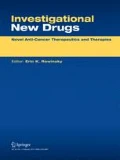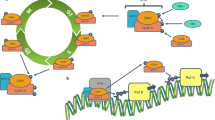Summary
Nasopharyngeal carcinoma (NPC) is common in Southeast Asia and over 40 % of NPC tissues have PIK3CA amplification. This study characterized the preclinical activity of a novel potent dual PI3K/mTOR inhibitor, PF-04691502, in five NPC cell lines: CNE-1, HK1, CNE-2, HONE-1 and C666-1, in which all of the cell lines possessed basal and activated expression of Akt and p70S6K. Over 80 % inhibition of cell growth in all of these cell lines were achieved after 72 h of PF-04691502 incubation and their IC50 were in hundred nanomolar range. CNE-2, HK1 and HONE-1 were selected to further evaluate the effect of PF-04691502 on cell cycle, apoptosis and Akt downstream signaling. PF-04691502 induced G0/G1 cell cycle arrest and apoptosis at 24 h incubation and it significantly abrogated Akt and its downstream signaling by suppressing the expression of p-mTOR, p-p70S6K, p-Akt(S473, T308), p-S6 and p-4E-BP1, suggesting its effectiveness in inhibition of translation and protein synthesis. Anti-proliferation was also observed in 3D culture system and spheroids formation of NPC cell line HONE-1-EBV was strongly inhibited by PF-04691502. Antitumor activity was observed in CNE-2 xenograft in 2 weeks of 10 mg/kg PF-09641502 treatment to tumor bearing athymic nude mice. Both tumor volume and weight in treatment group were significantly lower than those in vehicle group while no obvious body weight decrease was found, suggesting this working dose was effective and well-tolerated. Additive effects were observed in combination of PF-09641502 with either cisplatin or paclitaxel. There were no synergistic effect observed in drug combination but PF-09641502 alone was effective in treating cisplatin resistant cell lines as compared to its parental control. The beneficial effects of PF-09641502 in both in vitro and in vivo studies for NPC warrant a further investigation.





Similar content being viewed by others
References
Yip WK, Leong VC, Abdullah MA, Yusoff S, Seow HF (2008) Overexpression of phospho-Akt correlates with phosphorylation of EGF receptor, FKHR and BAD in nasopharyngeal carcinoma. Oncol Rep 19(2):319–328
Chen J, Hu CF, Hou JH, Shao Q, Yan LX, Zhu XF, Zeng YX, Shao JY (2010) Epstein-Barr virus encoded latent membrane protein 1 regulates mTOR signaling pathway genes which predict poor prognosis of nasopharyngeal carcinoma. J Transl Med 8:30. doi:10.1186/1479-5876-8-30
Loong HH, Ma BB, Chan AT (2008) Update on the management and therapeutic monitoring of advanced nasopharyngeal cancer. Hematol Oncol Clin North Am 22(6):1267–1278, x. doi:10.1016/j.hoc.2008.08.012
Huang XM, Dai CB, Mou ZL, Wang LJ, Wen WP, Lin SG, Xu G, Li HB (2009) Overproduction of cyclin D1 is dependent on activated mTORC1 signal in nasopharyngeal carcinoma: implication for therapy. Cancer Lett 279(1):47–56. doi:10.1016/j.canlet.2009.01.020
Morrison JA, Gulley ML, Pathmanathan R, Raab-Traub N (2004) Differential signaling pathways are activated in the Epstein-Barr virus-associated malignancies nasopharyngeal carcinoma and Hodgkin lymphoma. Cancer Res 64(15):5251–5260. doi:10.1158/0008-5472.CAN-04-0538
Ma BB, Lui VW, Hui EP, Lau CP, Ho K, Ng MH, Cheng SH, Tsao SW, Chan AT (2010) The activity of mTOR inhibitor RAD001 (everolimus) in nasopharyngeal carcinoma and cisplatin-resistant cell lines. Invest New Drugs 28(4):413–420. doi:10.1007/s10637-009-9269-x
Yuan J, Mehta PP, Yin MJ, Sun S, Zou A, Chen J, Rafidi K, Feng Z, Nickel J, Engebretsen J, Hallin J, Blasina A, Zhang E, Nguyen L, Sun M, Vogt PK, McHarg A, Cheng H, Christensen JG, Kan JL, Bagrodia S (2011) PF-04691502, a potent and selective oral inhibitor of PI3K and mTOR kinases with antitumor activity. Mol Cancer Ther 10(11):2189–2199. doi:10.1158/1535-7163.MCT-11-0185
Herzog A, Bian Y, Vander Broek R, Hall B, Coupar J, Cheng H, Sowers A, Cook J, Mitchell JB, Chen Z, Kulkarni A, Van Waes C (2013) PI3K-mTOR inhibitor PF-04691502 anti-tumor activity is enhanced with induction of wild-type TP53 in human xenograft and murine knockout models of head and neck cancer. Clin Cancer Res. doi:10.1158/1078-0432.CCR-12-2716
Kinross KM, Brown DV, Kleinschmidt M, Jackson S, Christensen J, Cullinane C, Hicks RJ, Johnstone RW, McArthur GA (2011) In vivo activity of combined PI3K/mTOR and MEK inhibition in a Kras(G12D);Pten deletion mouse model of ovarian cancer. Mol Cancer Ther 10(8):1440–1449. doi:10.1158/1535-7163.MCT-11-0240
Wander SA, Zhao D, Besser AH, Hong F, Wei J, Ince TA, Milikowski C, Bishopric NH, Minn AJ, Creighton CJ, Slingerland JM (2013) PI3K/mTOR inhibition can impair tumor invasion and metastasis in vivo despite a lack of antiproliferative action in vitro: implications for targeted therapy. Breast Cancer Res Treat 138(2):369–381. doi:10.1007/s10549-012-2389-6
Wang FZ, Peng J, Yang NN, Chuang Y, Zhao YL, Liu QQ, Fei HR, Zhang JG (2013) PF-04691502 triggers cell cycle arrest, apoptosis and inhibits the angiogenesis in hepatocellular carcinoma cells. Toxicol Lett. doi:10.1016/j.toxlet.2013.04.018
Simmons BH, Lee JH, Lalwani K, Giddabasappa A, Snider BA, Wong A, Lappin PB, Eswaraka J, Kan JL, Christensen JG, Shojaei F (2012) Combination of a MEK inhibitor at sub-MTD with a PI3K/mTOR inhibitor significantly suppresses growth of lung adenocarcinoma tumors in Kras(G12D-LSL) mice. Cancer Chemother Pharmacol 70(2):213–220. doi:10.1007/s00280-012-1899-6
Britten C, Adjei A, Millham R, Houk B, Wainberg Z, Guthrie T, Dy G, LoRusso P (2010) First-in-human study of PF-04691502, a small-molecule, oral, dual inhibitor of PI3K and mTOR in patients with advanced cancer: preliminary report on safety and pharmacokinetics. Paper presented at the EORTC-NCI-AACR Symposium on Molecular Targets and Cancer Therapeutics, Berlin, Germany, November 16–19, 2010
Chan SL, Wong CH, Lau CP, Zhou Q, Hui CW, Lui VW, Ma BB, Chan AT, Yeo W (2013) Preclinical evaluation of combined TKI-258 and RAD001 in hepatocellular carcinoma. Cancer Chemother Pharmacol. doi:10.1007/s00280-013-2139-4
Ma BB, Lui VW, Hui CW, Lau CP, Wong CH, Hui EP, Ng MH, Tsao SW, Li Y, Chan AT (2013) Preclinical evaluation of the AKT inhibitor MK-2206 in nasopharyngeal carcinoma cell lines. Invest New Drugs 31(3):567–575. doi:10.1007/s10637-012-9896-5
Ma BB, Lui VW, Poon FF, Wong SC, To KF, Wong E, Chen H, Lo KW, Tao Q, Chan AT, Ng MH, Cheng SH (2010) Preclinical activity of gefitinib in non-keratinizing nasopharyngeal carcinoma cell lines and biomarkers of response. Invest New Drugs 28(3):326–333. doi:10.1007/s10637-009-9316-7
O’Reilly KE, Rojo F, She QB, Solit D, Mills GB, Smith D, Lane H, Hofmann F, Hicklin DJ, Ludwig DL, Baselga J, Rosen N (2006) mTOR inhibition induces upstream receptor tyrosine kinase signaling and activates Akt. Cancer Res 66(3):1500–1508. doi:10.1158/0008-5472.CAN-05-2925
Ma BLV, Ho K, Lau CPY, Ng M, Cheng SH, Tsang CM, Tsao SW, Shi M, Hui EP, Chan ATC (2010) Preclinical evaluation of the dual PI3K-mTOR inhibitor BEZ235 in nasopharyngeal carcinoma cell lines. In Proc Am Assoc Cancer Res Meeting, Chicago Abstract 1638
Wallin JJ, Guan J, Prior WW, Lee LB, Berry L, Belmont LD, Koeppen H, Belvin M, Friedman LS, Sampath D (2012) GDC-0941, a novel class I selective PI3K inhibitor, enhances the efficacy of docetaxel in human breast cancer models by increasing cell death in vitro and in vivo. Clin Cancer Res 18(14):3901–3911. doi:10.1158/1078-0432.CCR-11-2088
Fekete M, Santiskulvong C, Eng C, Dorigo O (2012) Effect of PI3K/Akt pathway inhibition-mediated G1 arrest on chemosensitization in ovarian cancer cells. Anticancer Res 32(2):445–452
Acknowledgments
This work is supported by an independent research grant from Pfizer. The authors would like to thank The Charlie Lee Charitable Foundation for the generous support of this study.
Conflict of interest
The authors declare that they have no conflict of interest in this study.
Author information
Authors and Affiliations
Corresponding author
Additional information
Chi Hang Wong and Herbert H. Loong contribute equally to this work
Findings of this study have been presented as a conference poster in the 2013 American Association for Cancer Research Annual Meeting held in Washington, D.C., USA in March 2013.
Rights and permissions
About this article
Cite this article
Wong, C.H., Loong, H.H., Hui, C.W.C. et al. Preclinical evaluation of the PI3K-mTOR dual inhibitor PF-04691502 as a novel therapeutic drug in nasopharyngeal carcinoma. Invest New Drugs 31, 1399–1408 (2013). https://doi.org/10.1007/s10637-013-0007-z
Received:
Accepted:
Published:
Issue Date:
DOI: https://doi.org/10.1007/s10637-013-0007-z




